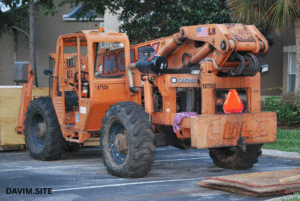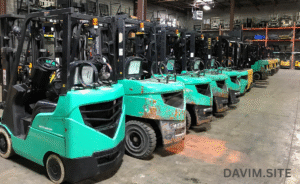The fast-paced industrial environment of today depends on forklifts more than ever to function. From warehouse logistics to building sites, forklift drivers guarantee that large goods are securely and effectively carried. Demand for qualified and licensed forklift operators is gradually growing as worldwide supply networks become more complicated. This page looks at the duties of a forklift operator, the necessary abilities, certification procedures, and career paths in this vital line of work.
What is a Forklift Operator?
A forklift operator is a qualified, skilled individual employed to operate a forklift, an industrial vehicle for lifting and movement of large objects. Warehouses, industries, shipping yards and building sites all use this equipment extensively. Material handling depends much on a forklift operator, who guarantees safe and orderly storage, loading, and emptying of products.
Among the many varieties of forklifts are pallet jacks, counterbalance forklifts, reach trucks, and rough terrain forklifts. Depending on the sector and surroundings, an operator might have to learn many forklift models.
Key Responsibilities of a Forklift Operator
The job responsibilities of a forklift operator vary slightly depending on the industry but typically include:
-
Loading and Unloading: Moving raw materials or finished goods from delivery trucks or storage areas.
-
Stock Organization: Placing items in designated storage areas and keeping them organized for easy retrieval.
-
Safety Inspections: Conducting routine inspections of the forklift to ensure it is in good working condition.
-
Inventory Management: Assisting warehouse managers with stock counts and inventory documentation.
-
Compliance with Safety Regulations: Adhering to OSHA and company-specific safety protocols to prevent accidents.
-
Transporting Goods: Moving materials from one area of the facility to another efficiently and without damage.
Skills Required to Become a Successful Forklift Operator
Operating a forklift isn’t just about moving goods from one place to another—it’s about doing it safely, efficiently, and responsibly. Here are the key skills needed:
1. Attention to Detail
A skilled forklift operator pays close attention to their surroundings. Warehouses and construction sites are busy environments, and being alert can prevent accidents.
2. Hand-Eye Coordination
Excellent hand-eye coordination is critical when maneuvering heavy equipment through narrow aisles or crowded spaces.
3. Mechanical Knowledge
Basic understanding of how forklifts function can help identify mechanical issues early and reduce downtime.
4. Time Management
Operators often work with tight schedules. Managing time efficiently is essential to meet deadlines and maintain workflow.
5. Communication
Strong communication skills are vital when coordinating with warehouse staff, truck drivers, and supervisors.
Training and Certification Requirements
In the U.S., OSHA (Occupational Safety and Health Administration) mandates forklift operators to be certified. Certification usually involves a combination of formal instruction (lectures, videos), practical training (hands-on operation), and an evaluation of performance.
Steps to Get Certified:
-
Enroll in a Forklift Training Course
Offered by vocational schools, community colleges, and private training organizations. -
Complete Classroom Instruction
Learn about forklift types, load handling, safety regulations, and maintenance. -
Practical Training
Hands-on sessions where trainees learn how to operate forklifts in real-world scenarios. -
Pass the Evaluation
Candidates must demonstrate their skills and knowledge in a practical test. -
Receive Certification
Upon successful completion, the trainee receives an OSHA-approved forklift certification valid for three years.
Work Environment and Conditions
Forklift operators work in diverse environments such as:
-
Warehouses
-
Distribution centers
-
Shipping docks
-
Construction sites
-
Manufacturing plants
Most operators work full-time; depending on their company, shifts could call for evenings, weekends, or holidays. The work may be physically taxing and expose one to noise, dust, and temperature swings.
Many times, operators are expected to don gloves, luminous vests, hard helmets, and steel-toe boots.
s.
Forklift Operator Salary and Job Outlook
According to the U.S. Bureau of Labor Statistics, the median pay for a forklift operator is approximately $40,000 per year (as of 2025), with experienced professionals earning upwards of $50,000. Overtime and shift differentials can increase total earnings significantly.
Job Outlook:
Employment of material moving machine operators, including forklift drivers, is projected to grow steadily. As e-commerce continues to expand, the demand for warehouse and logistics staff—including forklift operators—is expected to remain high.
Advancement Opportunities
A forklift operator job can be a stepping stone to other roles in logistics and supply chain management. With experience and additional training, forklift operators can advance to:
-
Warehouse Supervisor
-
Logistics Coordinator
-
Inventory Manager
-
Forklift Trainer
-
Operations Manager
Many companies offer career development programs, giving operators opportunities to grow within the organization.
Tips for Getting Hired as a Forklift Operator
To stand out in a competitive job market, here are some tips:
1. Get Certified
Employers prioritize certified operators who meet OSHA standards.
2. Build a Strong Resume
Include relevant experience, certifications, and technical skills. Tailor your resume for each job application.
3. Gain Experience
If you’re new to the field, consider taking temporary or entry-level warehouse jobs to build hands-on experience.
4. Network
Connect with others in the industry through job fairs, LinkedIn, or vocational schools.
5. Stay Updated
Regulations and machinery evolve. Stay current with certifications and training to remain competitive.
Forklift Safety Tips
Safety is the cornerstone of being a great forklift operator. Here are essential safety tips:
-
Inspect Equipment Daily: Check brakes, tires, forks, lights, and fluid levels.
-
Wear Proper PPE: Personal protective equipment reduces injury risks.
-
Don’t Overload: Always follow the rated capacity of the forklift.
-
Stay Alert: Be aware of pedestrians and other vehicles.
-
Use Seatbelts: Always buckle up when operating the forklift.
-
Drive at Safe Speeds: Avoid sharp turns and sudden stops.
Forklift-related accidents are common but preventable. Regular training and vigilance can make a big difference.
Industries That Hire Forklift Operators
You’ll find forklift operators in nearly every industry involving logistics or physical goods. Some of the largest employers include:
-
E-commerce giants (e.g., Amazon, Walmart)
-
Construction companies
-
Shipping and freight companies
-
Manufacturing plants
-
Retail distribution centers
-
Food and beverage production companies
Each industry may have specific equipment and handling protocols, so adaptability is a key trait for forklift operators.

Conclusion
Operating a forklift provides a consistent and fulfilling job path with plenty of chances for development. Right training, a dedication to safety, and a strong work ethic can help you create a prosperous career in an industry still vital to the backbone of world business.
Pursuing forklift operator certification might be your first step in a bright and recognised career, regardless of your starting point or career transition goal.
Meta Description
“Explore a complete guide to becoming a forklift operator: job roles, certification, salary, skills needed, and career growth. Start your career in logistics today!”
